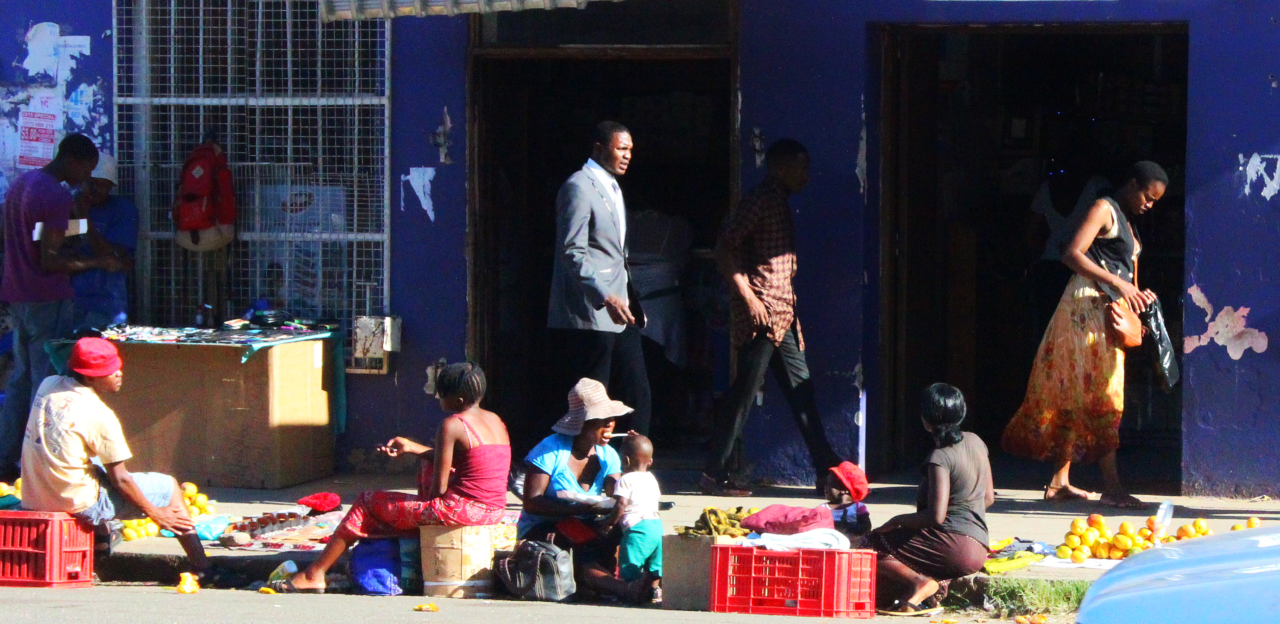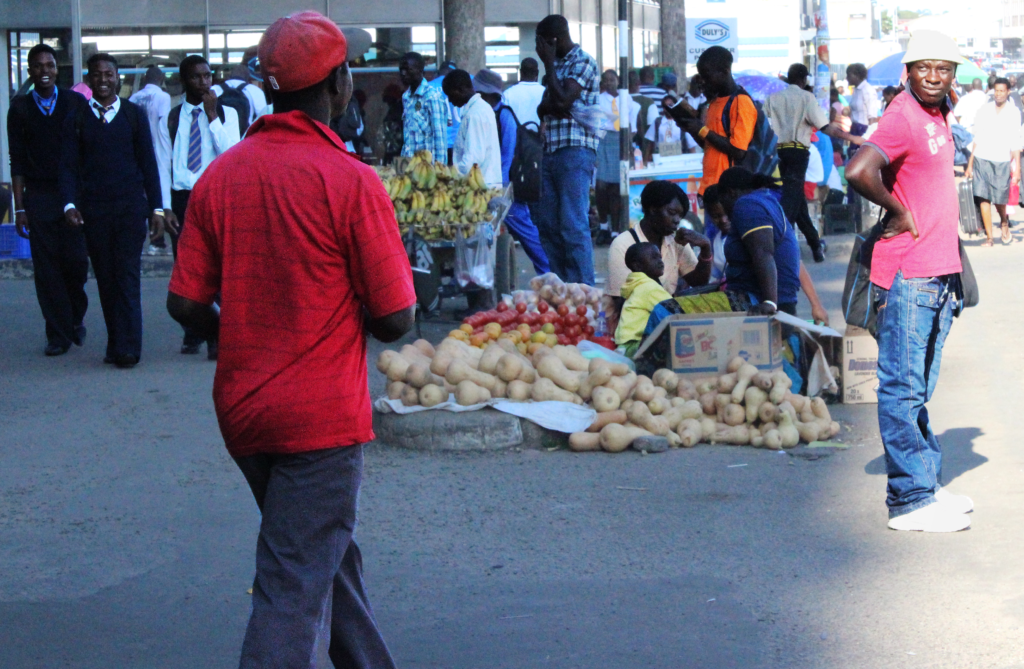Zimbabwe Women Bear Brunt of Poverty
There is an African proverb that says “When two elephants fight, it is the grass that suffers.” When wars and ethnic conflicts occur and economies collapse due to corruption and mismanagement, women are the group whose rights, aspirations, social needs and dignity are most trampled upon. The women of Zimbabwe have borne the brunt of […] A market in Zimbabwe. Photo by Edna Machirori.
A market in Zimbabwe. Photo by Edna Machirori.
There is an African proverb that says “When two elephants fight, it is the grass that suffers.”
When wars and ethnic conflicts occur and economies collapse due to corruption and mismanagement, women are the group whose rights, aspirations, social needs and dignity are most trampled upon.
The women of Zimbabwe have borne the brunt of the poverty and economic hardships resulting from the retrogressive policies of the government. That narrative would be incomplete, though, without acknowledging the resilience, tenacity, bravery and selflessness of Zimbabwean women in fighting for the survival of their families. They have done so in the face of political upheavals that the Zimbabwe Catholic Bishops Conference has described as having led to a general despair and a loss of hope among the people.
In Zimbabwe, as in the rest of Africa, independence did not automatically usher in participatory democracy and the fulfilment of the lofty ideals of prosperity and improved living standards for formerly oppressed populations. At different stages of the political and economic crisis in Zimbabwe, the challenges women have faced have included empty supermarket shelves and shortages of all basic commodities necessary for the sustenance of a normal life.
In recent years, local media has reported women in the rural areas resorting to tree bark, roots, wild fruits and insects to feed their families. In towns, the one-meal-a-day regime is widespread. Sanitary ware was at one stage so scarce nationwide that the local media documented the indignity of women resorting to the use of newspapers.
A respected Jesuit priest, Father Oskar Wermter, who is a parish priest in Mbare, a poor suburb of the capital, Harare, has remarked that at the height of the Zimbabwe crisis he saw urban poverty as he had never seen it before. Its feminisation manifested itself most conspicuously in an increase in the number of female and lone-mother headed households. This was formerly more common in rural Zimbabwe because of male labor migration to cities and towns.
The government’s controversial multi-decade land reform program led to the demise of the country’s agricultural sector, with 300 000 workers losing their jobs. Though land reform was perfectly justified to redress colonial imbalances, it was implemented in such a haphazard, vindictive and violent manner as to cause an international outcry. Land was violently seized from white commercial farmers without compensation and some farmers were killed. Whereas Zimbabwe was once the envy of most other countries south of the Sahara, recognized as the breadbasket of the region, it was now mocked by commentators as a basket case. Those who were allocated farms, mostly ruling elites, have failed to utilise the land productively, leading to perennial food insecurity and shortages.
Millions of Zimbabweans require food aid every year, according to the Food and Agriculture Organization of the United Nations. Other destructive government policies have resulted in massive deindustrialisation because of the continued flight of foreign investment. Up to 5,000 companies have shut down, according to the Zimbabwe Economic Society. This triggered an exodus by an estimated 3 to 4 million Zimbabweans, mostly men, into neighboring countries and abroad to seek greener pastures. The role of family providers and protectors thus fell on the shoulders of the women left behind.
In 1991, Zimbabwe embarked on an Economic Structural Adjustment Programme (ESAP) on the advice of the International Monetary Fund. The program was supposed to reverse a negative balance of payments situation brought about by poor levels of foreign investment, but it did not have the desired effect, according to a 1998 study conducted by the Zimbabwe Women’s Resource Centre Network (ZWRCN), in conjunction with the Southern African Research and Documentation Centre (SARDC). The study concluded that, in fact, ESAP “had a devastating impact on women, reversing some of the social development gains made in the first five years.”
Women have felt the pinch the most because in a patriarchal society such as Zimbabwe, they are at the bottom of the rung in all spheres. By a confounding irony, however, they are at the same time regarded as the backbone of society. Their roles as household managers, caregivers for the sick and elderly, hands-on guardians of orphans and nurturers of children all multiply the weight of the load they carry.
Zimbabwe’s economic decline has been spectacular since 2000, when the government embarked on the seizure of farms from white commercial farmers, sparking a dispute in which the European Union and the United States imposed targeted sanctions against the leadership of the ruling Zimbabwe African National Union – Patriotic Front (ZANU–PF) party.
In reality, however, things began deteriorating just over a decade after independence from Britain in 1980. Living standards have been in free fall ever since, and women have been struggling against poverty, economic deprivation and marginalization in varying degrees since then. Up to 1989, the country was classified in the World Bank’s World Development Report as a lower middle income developing country. By 1998, it had been downgraded to a low income developing country.
In May 2005, without warning, the Zimbabwean government embarked on a clean-up exercise in cities and towns across the country. Code-named Operation Murambatsvina, it involved the demolition of houses, vendors’ markets, flea markets and informal business premises on the pretext that they were illegal structures. As a result, 700,000 people in urban areas across Zimbabwe were rendered homeless and lost their sources of livelihood, according to a report by a United Nations Special Envoy on Human Settlements. A further 2.3 million were negatively impacted by the exercise in varying degrees. Women constituted 95% of those left homeless, and many found themselves living in the open with their children in the middle of the Southern Hemisphere’s winter season with no access to food, water, sanitation or health care.
The Operation was condemned by the United Nations and the international community as a gross violation of human rights. Civil Society groups in Zimbabwe condemned the exercise as a vindictive strike by the Robert Mugabe government to punish urban dwellers for voting for the opposition in successive disputed parliamentary and presidential elections in which he and his party refused to concede defeat.
Women flood the streets and pavements of cities and towns across Zimbabwe to eke out a living from selling whatever they can lay their hands on. In the rural setting, vendors can be seen on highway verges, bus stations and shopping centers. The local media has described the whole of Zimbabwe as having been turned into a vending site.
Women constitute the majority of this sea of humanity hunting for the elusive American dollar so that they can feed, clothe and send their children to school. Supermarkets and shops are now well stocked with mostly imported goods but the prices are out of reach for most people.

“Vending is a thankless task but I have no other option,” says Maina Chitima, a 46-year-old mother of four. It is mid-morning as she sits on a dusty pavement in the Harare central business district struggling to keep her eyes open. She has been up since 3 a.m., when she groped in the dark to throw some clothes on. She then tiptoed out of her two-room lodgings and proceeded to the farmers market to order her stock for the day.
After arranging shared transport for her produce to be taken into town, she rushed home to get her two older children off to school. She and her youngest children, twin girls aged four, then caught a minibus into town to begin a long day. She brings the toddlers with her to the streets because she cannot afford to send them to a daycare center. Her unemployed husband disappears for weeks on end and does not pull his weight in the household. Chitima and all the other vendors are subjected to regular police raids when their goods are seized for vending in undesignated spaces.
“Having your goods confiscated is a painful setback especially when you know that corrupt police officers conduct these raids for their own survival,” she says. The police are not only poorly paid but sometimes go for months without being paid at all. Vendors accuse them of converting seized goods to their own use and benefit.
“I cannot abandon my children,”says Chitima when asked why she does not give up. “It is not easy for a woman to walk away from parental responsibilities,” she states to a chorus of agreement from the other women vendors within earshot.
“If there is not enough to eat, a mother goes without so that her children can share whatever morsels are available,” another women vendor chimes in.
Thousands of women across the country face similar days.
One 45-year-old mother, a university graduate, holds down a job for which she receives no salary.
“I have found the going tough as a single mother. I only work for this company because it pays my child’s school fees.” She has to think of other ways to put food on the table and pay rent for her lodgings.
“I am very vulnerable as I always have to negotiate with the landlord about the rent. The man takes advantage of my position to make sexual advances and I have found myself giving in.”
Mai Clayton, a widow struggling to support her four children, sells cigarettes, energy drinks and potato crisps on the streets. On a good day, she can make $20 from which she must set aside a sum for restocking, transport and food. She also sometimes travels to South Africa and Mozambique to order items to sell back in Zimbabwe.
Jessica Machingura is doing slightly better. She drives her own taxi, which she bought when a former employer helped her to get a hire purchase arrangement.
“I sacrifice every penny I make for my daughter who is studying law outside the country.”
Machingura is building a house for herself in a medium density suburb.
In Zimbabwe, female poverty is multidimensional. It also means being powerless and voiceless with little chance of breaking out of the vicious cycle unless women are empowered financially. Other African countries such as Tanzania, Kenya and Nigeria have women’s banks offering loans to enable female entrepreneurs to finance small business projects and ventures. This kind of support is glaringly lacking in Zimbabwe where women cannot access bank loans because they usually do not have collateral.
An attempt was made a decade ago to set up a women’s bank. However, OMA Bank as it was to be called, failed to take off because, the media reported, the members could not raise the initial capital deposit of $50 million.
Supporting women’s entrepreneurship through micro finance loans has been demonstrated to be a great success in Bangladesh where an estimated 100 million people live in extreme poverty. In Zimbabwe, this would be a drop in the ocean but would at least be a start to rescue women from the clutches of poverty and hardship.
Your support matters…Independent journalism is under threat and overshadowed by heavily funded mainstream media.
You can help level the playing field. Become a member.
Your tax-deductible contribution keeps us digging beneath the headlines to give you thought-provoking, investigative reporting and analysis that unearths what's really happening- without compromise.
Give today to support our courageous, independent journalists.



You need to be a supporter to comment.
There are currently no responses to this article.
Be the first to respond.